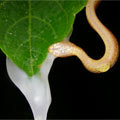Community Ecology
Editor(s):
Uffe N Nielsen |
How does the depth of a lake influence the complexity of the community living within it? Why do some places contain more species than others? Is there competition in nature?
Community ecology seeks to answer these and other questions about communities. An ecological community is a group of actually or potentially interacting species living in the same location. Communities are bound together by a shared environment and a network of influence each species has on the other.
Community ecology is an expanding and rich subfield of ecology. Ecologists investigate the factors that influence biodiversity, community structure, and the distribution and abundance of species. These factors include interactions with the abiotic world and the diverse array of interactions that occur between species. Species interactions, including competition, predation, herbivory, parasitism and mutualisms, are the basic for most of the research in community ecology. Questions of interest include: What are the feeding relationships among species? Who competes with whom and for what resources? Does the presence of some species benefit others?
Food webs are a graphical depiction of the interconnections among species based on feeding relationships, and are a core concept of the field. The role of keystone species in communities is another important tenet, and one of the best-known ideas in community ecology. Keystone species are those whose presence or absence profoundly affects other species in the community, disproportionately to its abundance.
Community ecologists not only study the structure of communities but also changes in that structure. What do volcanoes, glaciers, sand dunes, storms, agriculture, and fire have in common? They all initiate the process of change in communities.
To develop a rich understanding of community ecology, begin with this introductory overview, and then explore the other summaries you’ll find below.
Community ecology seeks to answer these and other questions about communities. An ecological community is a group of actually or potentially interacting species living in the same location. Communities are bound together by a shared environment and a network of influence each species has on the other.
Community ecology is an expanding and rich subfield of ecology. Ecologists investigate the factors that influence biodiversity, community structure, and the distribution and abundance of species. These factors include interactions with the abiotic world and the diverse array of interactions that occur between species. Species interactions, including competition, predation, herbivory, parasitism and mutualisms, are the basic for most of the research in community ecology. Questions of interest include: What are the feeding relationships among species? Who competes with whom and for what resources? Does the presence of some species benefit others?
Food webs are a graphical depiction of the interconnections among species based on feeding relationships, and are a core concept of the field. The role of keystone species in communities is another important tenet, and one of the best-known ideas in community ecology. Keystone species are those whose presence or absence profoundly affects other species in the community, disproportionately to its abundance.
Community ecologists not only study the structure of communities but also changes in that structure. What do volcanoes, glaciers, sand dunes, storms, agriculture, and fire have in common? They all initiate the process of change in communities.
To develop a rich understanding of community ecology, begin with this introductory overview, and then explore the other summaries you’ll find below.
Explore This Subject
Basic
Intermediate
Advanced














